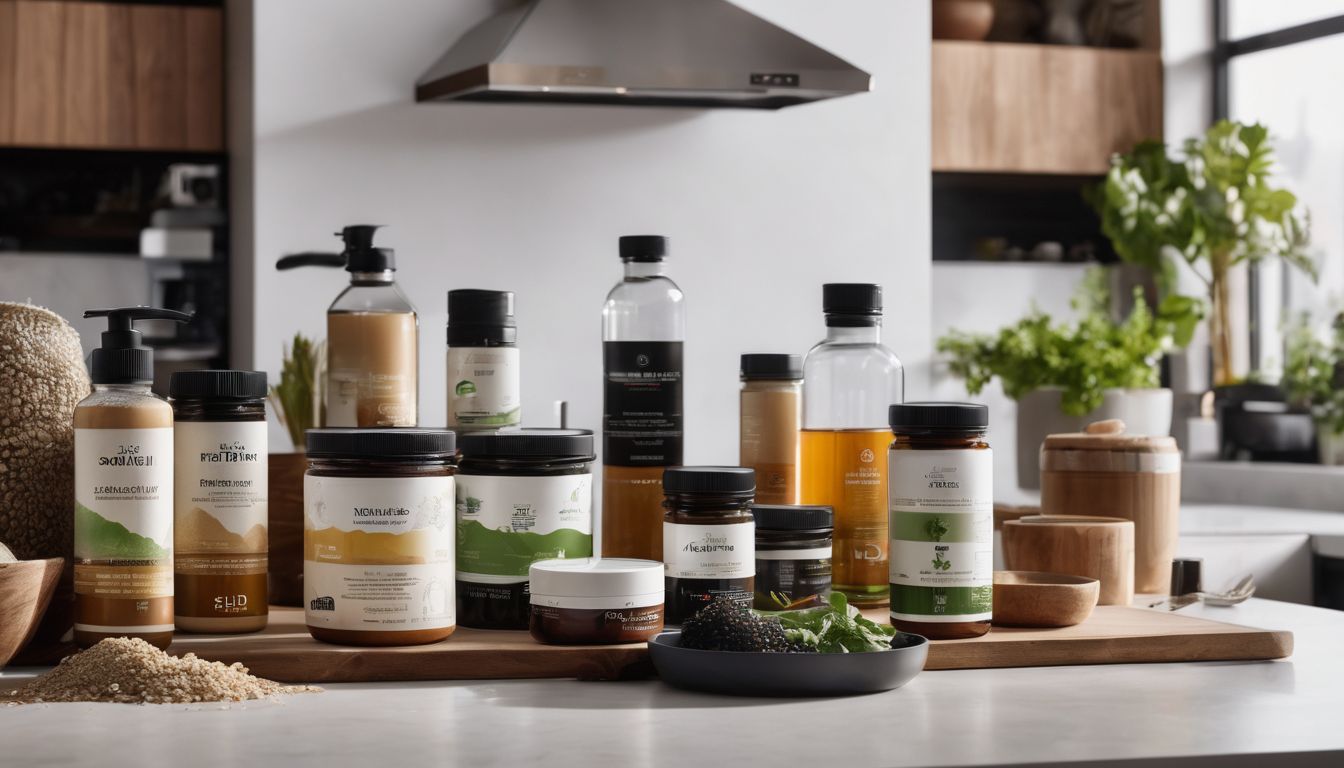We’re all keenly aware of the burden plastics have placed upon our cherished planet, aren’t we? Rest assured, you’re not alone in feeling swamped by a sea of non-degrading waste that blights the natural beauty of Mother Earth.
Yet, amidst this struggle emerges a glimmering beacon: biodegradable consumer products are heralding a new era of sustainability. We’ve thoroughly explored their transformative potential and are eager to share these insights with you.
So let’s embark on this journey together and envisage what awaits us on the horizon!
Key Takeaways
- Biodegradable consumer goods decompose naturally, turning into non – toxic components unlike traditional plastics that can last for centuries and harm the environment.
- Choosing biodegradable products reduces pollution, protects wildlife, and diminishes human health risks associated with non-biodegradable waste.
- More companies are developing biodegradable alternatives using plant – based materials and sustainable processes to lessen environmental impact.
- Collaborations between businesses, governments, and environmental organisations play a vital role in promoting the use of eco-friendly biodegradable goods.
- Educating consumers about the importance of choosing biodegradable items encourages responsible consumption habits for a greener future.
Understanding Biodegradable Consumer Goods
Biodegradable consumer goods are products that can decompose naturally without harming the environment. It’s important to understand the characteristics and benefits of biodegradable items to make informed and sustainable choices.
Definition and characteristics
Biodegradable consumer goods break down naturally in the environment, turning into non-toxic components. These products are crafted from materials like plant-based substances and bioplastics which decompose with the help of microorganisms such as bacteria and fungi.
Unlike traditional plastics that can linger for centuries, these eco-friendly alternatives leave minimal impact on our planet.
Characteristics of these sustainable solutions include compostability, where they can be turned into nutrient-rich soil, and recyclability, offering a circular economy approach to waste management.
They support green consumerism by reducing reliance on finite resources and cutting down greenhouse gas emissions during decomposition. Let’s explore why choosing biodegradable options plays a crucial part in safeguarding nature’s balance.
Importance of using biodegradable products
Choosing biodegradable products is crucial for preserving our environment and reducing the impact of non-biodegradable goods. By opting for environmentally friendly alternatives such as compostable packaging and plant-based consumer goods, we can significantly decrease pollution, protect wildlife, and mitigate human health risks.
Embracing sustainable options like eco-friendly cutlery or biodegradable plastics empowers us to make ethical consumption choices that contribute to a healthier planet. As environmentally conscious individuals, supporting conservation and environmental sustainability through the use of biodegradable products is key to creating a greener future.
Incorporating biodegradable solutions into our everyday lives not only benefits the environment but also fosters a culture of responsible consumption. Choosing renewable materials over harmful ones promotes ethical stewardship towards our planet’s resources while driving positive change in product development across various industries.
Making informed decisions about what we consume plays a pivotal role in shaping an environmentally conscious society where sustainability is at the forefront of our actions.
The Negative Impact of Non-Biodegradable Goods
Non-biodegradable goods contribute to increased pollution and waste, posing harm to the environment and wildlife. Additionally, they also pose risks to human health.
Increased pollution and waste
Non-biodegradable consumer goods contribute to increased pollution and waste, posing a significant threat to the environment. The use of non-biodegradable materials like disposable cutlery and food packaging leads to accumulation in landfills and water bodies, contributing to environmental degradation.
This results in harmful consequences for wildlife and ecosystems, adding pressure on natural resources.
Manufacturing processes for non-biodegradable items also lead to higher energy consumption and emissions of greenhouse gases, exacerbating environmental concerns. Moreover, as these products do not decompose naturally, they continue to take up space in landfills or end up as litter in natural habitats.
Harm to the environment and wildlife
Non-biodegradable consumer goods pose a significant threat to the environment and wildlife. These products often end up in landfills or water bodies, leading to increased pollution and habitat destruction.
The persistence of non-biodegradable materials further exacerbates the problem by disrupting natural ecosystems and endangering various species. As a result, it is vital to transition towards eco-friendly alternatives such as biodegradable consumer goods, made from sustainable plant-based materials.
The use of non-biodegradable products directly contributes to environmental degradation and harms wildlife. Plastic waste, for example, poses an immediate danger to marine life as animals mistake it for food or become entangled in discarded items.
Human health risks
Non-biodegradable consumer goods pose significant risks to human health. Chemicals released from these products, such as plastics and synthetic materials, can leach into the environment, contaminating soil and water sources.
This contamination can subsequently enter the food chain and impact human health through consumption of contaminated produce or drinking water. Additionally, non-biodegradable materials can contribute to air pollution when they are burned or degraded over time, releasing harmful particles that can be inhaled and cause respiratory problems.
Furthermore, the production process of non-biodegradable goods often involves toxic substances that may harm workers in manufacturing plants as well as end-users who come into contact with these items on a regular basis.
Moving Towards a Biodegradable Future
Many companies are now offering biodegradable products as an alternative to traditional non-biodegradable goods. Waste reduction initiatives, education and awareness efforts, and ongoing research and innovations are all contributing to a greener future for consumer goods.
Companies offering biodegradable products
- Some companies produce eco-friendly alternatives made from organic additives, such as plant-based consumer goods.
- Others focus on creating sustainable products using degradable materials that break down safely in the environment.
- Many companies are implementing waste reduction initiatives to minimise the use of non-biodegradable packaging and materials in their products.
- Several businesses are actively involved in education and awareness efforts aimed at promoting the benefits of biodegradable options to consumers.
- Some innovative companies are investing in research and development to develop new biodegradable solutions for various consumer goods.
Waste reduction initiatives
To reduce waste, we can all take steps to support the environment. Here are some initiatives to consider:
- Embracing reusable products such as water bottles, shopping bags, and containers to minimise single-use plastics.
- Composting organic waste at home or supporting community composting programmes to divert biodegradable materials from landfills.
- Encouraging the use of refillable products for items like cleaning supplies and personal care products, reducing packaging waste.
- Supporting businesses that prioritise sustainable packaging and offer take – back programmes for product containers.
- Participating in local clean – up events and advocating for responsible waste management practices in your community.
- Choosing products with minimal or recyclable packaging to reduce unnecessary waste generation.
Education and awareness efforts
We actively promote education and awareness about the benefits of biodegradable consumer goods, empowering individuals to make eco-conscious choices. Our initiatives include educational campaigns in schools and communities, highlighting the importance of using plant-based consumer goods to reduce pollution and waste.
We collaborate with environmental organisations to host workshops and events, spreading knowledge about the harmful effects of non-biodegradable products on the environment and wildlife.
By engaging with consumers through informative resources and social media platforms, we aim to cultivate a sustainable mindset for a greener tomorrow.
Research and innovations
We actively pursue ongoing research and innovations to enhance the biodegradability of consumer goods. Scientists are continuously exploring new plant-based materials to create eco-conscious products that break down naturally, reducing environmental impact.
Cutting-edge technologies and sustainable alternatives play a pivotal role in revolutionising the industry, ensuring a greener future for all.
As we delve deeper into research and innovations, it’s essential to embrace these advancements in creating plant-based consumer goods that align with our commitment to conservation and environmental sustainability.
Challenges and Opportunities for a Sustainable Tomorrow
Collaborations and partnerships between businesses, governments, and environmental organisations are key to overcoming challenges in transitioning towards biodegradable consumer goods.
By working together, we can create a more sustainable future for generations to come.
Collaborations and partnerships
We actively seek partnerships with like-minded businesses and organisations to promote the use of biodegradable consumer goods. By joining forces, we can amplify our impact, drive innovation, and reach a wider audience with our eco-conscious message.
Through collaborations, we can develop new sustainable products and solutions that benefit both the environment and consumers.
Partnerships enable us to combine resources in research, development, and distribution, ultimately accelerating the transition towards a greener future. Together, we can advocate for government support and influence policy changes that encourage the adoption of biodegradable alternatives.
Government regulations
Government regulations play a vital role in driving the shift towards biodegradable consumer goods. They set standards for eco-friendly product manufacturing and disposal, ensuring that companies adhere to environmentally sustainable practices.
These regulations also create incentives for businesses to innovate and invest in biodegradable technologies, contributing to a greener future. Government policies can empower consumers by providing clear guidelines on identifying and choosing biodegradable products, ultimately fostering a more conscious and sustainable society.
Moreover, government regulation stimulates research and development in eco-friendly materials and processes. This encourages collaboration between industries, researchers, and policymakers to advance the use of plant-based consumer goods while simultaneously reducing environmental impact.
Economic and environmental benefits
Choosing biodegradable consumer goods not only benefits the environment but also makes economic sense. By supporting companies that offer biodegradable products, we are contributing to the reduction of waste, pollution, and harm to wildlife.
Additionally, as more consumers choose eco-conscious options, there is a shift towards sustainable practices in manufacturing and packaging. This creates opportunities for businesses to innovate and develop new solutions, ultimately driving economic growth while reducing our ecological footprint.
Moreover, investing in biodegradable consumer goods provides financial incentives for companies to continue their research and development efforts into sustainable alternatives. As demand grows, production costs may decrease due to economies of scale.
Ultimately, this fosters a cycle of positive change benefiting both our planet and our pockets.
Empowering consumers to make conscious choices
Consumers play a critical role in the shift towards biodegradable products. By choosing plant-based consumer goods, individuals can actively support conservation and environmental sustainability.
Educating oneself about the importance of eco-conscious choices and seeking out biodegradable options empowers us to make positive contributions to waste reduction and environmental health.
Understanding the impact of our consumption habits encourages us to seek out alternative products that align with our values. By taking steps towards embracing biodegradable alternatives, we contribute to building a greener future for generations to come.
Conclusion: The Future is Biodegradable and Greener.
Consumer goods are shifting towards a greener, more sustainable future with the rise of biodegradable products. Companies are increasingly offering plant-based consumer goods, which are ecoconscious and less harmful to the environment.
As environmentally conscious individuals, supporting conservation and environmental initiatives plays a vital role in advocating for these changes. By empowering consumers to make conscious choices and encouraging waste reduction, we can contribute towards a future that is biodegradable and greener.
The economic and environmental benefits of embracing biodegradable consumer goods cannot be overstated. Collaborations and partnerships between businesses, government regulations promoting sustainability, as well as ongoing education and awareness efforts will pave the way for a more environmentally friendly tomorrow.
FAQs
1. What are biodegradable consumer goods?
Biodegradable consumer goods are products designed to break down naturally by microorganisms in the environment, often made from plant-based materials.
2. Why is the future of biodegradable goods important?
The future of biodegradable consumer goods is crucial as they reduce waste and help protect our planet by offering eco-friendly alternatives.
3. Can biodegradable items replace all types of consumer goods?
Many everyday items can be replaced with plant-based, biodegradable options, though research and innovation continue to expand their range and effectiveness.
4. How will consumers benefit from using biodegradable products in the future?
Consumers will enjoy a cleaner environment and contribute to sustainability efforts while using effective products that align with a green-conscious lifestyle.





